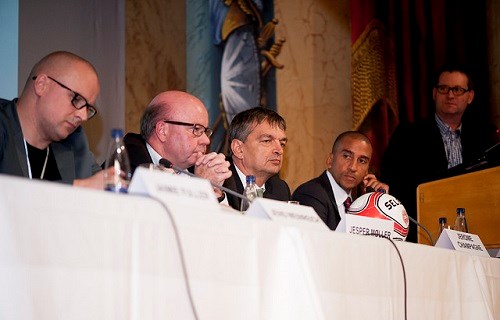To be or not to be… a FIFA President

On the panel discussing FIFA were (from the left) Jens Weinreich, Jesper Møller, Jérôme Champagne and David Nakhid. Photo: Thomas Søndergaard/Play the Game
27.10.2015
By Steve Menary(Updated)
In the historical setting, the first debate to feature more than one FIFA presidential candidate took place, when former FIFA general secretary Jérôme Champagne and David Nakhid of Trinidad & Tobago outlined their visions during Play the Game 2015 in Aarhus, Denmark.
Nakhid argued that the weakest 85% of FIFA members need to be brought up to the standard of the top 15%, who largely control all the money and competitions.
“When you play expansive football but there is no depth and you have the ball, you only have possession. That is FIFA now. Fifteen per cent [of FIFA’s 209 members] feel enfranchised but 85% do not. What do we do about that?” Nakhid asked. “FIFA must use the peripheral nations as its base.”
The former professional footballer likened UEFA’s role to that of European countries in the ongoing refugee crisis. “Everyone wants to get to UEFA,” said Nakhid, who mentioned UEFA’s plans for a third European club competition.
He insisted that he was not opposed to UEFA but was “pro development”.
“UEFA has looked after itself. We cannot continue to be Eurocentric, and at the same time we can’t dilute the strong end of the game,” he added.
“We take the best out of FIFA and throw out the rest.”
Although Nakhid did not provide a lot of detail, he insisted: “Technocrats must be preferred to sit on committees. “We need FIFA to enhance the role of the development officers. Despite the heroic stories that you hear about players from our region and Africa, development has been stagnant.”
Seperation of FIFA development and commercial operations
Champagne insisted that the FIFA Executive Committee (ExCo) does not function properly and argued that FIFA’s development and commercial operations need separating.
Champagne also proposed greater development and promised to build 400 artificial pitches in four years and commented that more than 100 members of FIFA have to survive on annual revenue of less than USD 2 million per year.
Champagne again insisted that the annual salary of the FIFA president must be public knowledge and called upon his rivals to engage in public debates in December, January and February.
He also said that he was proud of his 11 years at FIFA. “All the people that worked to suspend me from FIFA are now suspended,” said Champagne, who admitted that he “disappeared” after the last presidential election because there was no way forward for the two campaigns that emerged.
He spoke more openly about his time at FIFA and added: “I attended more than 45 ExCo meetings and I tell you at some of the behaviour was not correct.”
At the event, both candidates said that more thought was needed about where future World Cups were held and also each argued during questioning for a greater role for women in football, which was staged on the day that UEFA general secretary Gianni Infantino joined the competition to succeed Sepp Blatter next February.
Champagne says he has the backing of eight national associations, while Nakhid has support from five FIFA members but both declined under questioning to reveal any of the countries that have backed their campaigns.
“They are afraid of the consequences,” said Champagne. While the atmosphere on the panel was good natured, Nakhid said he did not expect a “nice campaign”.
“There are people behind the scenes striking deals,” warned Nakhid. Champagne added that: “There is a pre-campaign of arrangements in five star hotels behind closed doors.”
Seven candidates in the running
There are now seven candidates with Tokyo Sexwale (South Africa), Prince Ali bin Hussein (Jordan), Musa Bility (Liberia) and Sheikh Salman bin Ebrahim al-Khalifa (Bahrain) also in the running.
Jesper Møller, the president of the Danish FA, the DBU, was also on the panel in the Elsinore Theatre and said that all six Nordic nations (Denmark, Faroe Islands, Finland, Iceland, Norway and Sweden) would meet in late November and try to agree a block vote for one candidate.
“We have to do something about FIFA. Enough is enough. It is not enough to vote for reforms if they are not implemented. That is why we need a new president. Now we five to 10 have candidates, we will invite them to Copenhagen,” Møller said.
Møller praised UEFA for having what he described as a ‘Plan B’ and the decision of Infantino to run after the body’s president Michel Platini was sidelined by a corruption investigation.
Infantino was, however, criticised for blocking FIFA reform in 2013 by another member of the panel, journalist Jens Weinreich.
Using the maxim that only 5% of corruption cases ever become known, Weinreich suggested that the total size of the damage caused at FIFA was already around USD 7 billion.
The German investigative journalist questioned whether there would even be a presidential election on February 26.
“Will there be a congress? Will there be a FIFA ExCo in February? I don’t think that decision is taken by FIFA,”said Weinreich, who was referring to the Swiss and US investigations into corruption in the world body.
Jaimie Fuller, co-founder of the New FIFA Now campaign, who was also on the panel, told delegates that they have invited the seven candidates for the FIFA presidential election to Brussels on January 27 to outline their vision to reform the crumbling world football body.





